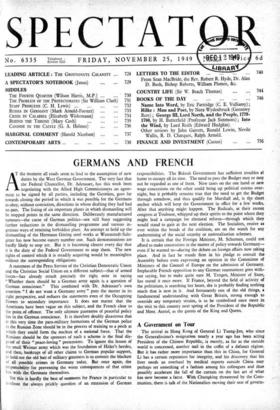GERMANS AND FRENCH
A statement of the Press Service of the Christian Democratic Union and the Christian Social Union on a different subject—that of armed forces—has already struck precisely the right note in saying "Whether there should be a German army again is a question of German conscience." This combined with Dr. Adenauer's own assertion "I do not want a Germany army" puts the matter in its right perspective, and reduces the statements even of the Occupying Powers to secondary importance. It does not matter that the Americans have been vague on this subject, and the French clear to the point of offence. The only ultimate guarantee of peaceful policy lies in the German conscience. It is therefore doubly disastrous that at this very time the para-military formations of the German police in the Russian Zone should be in the process of training to a pitch at which they could form the nucleus of a national force. That the Russians should be the sponsors of such a scheme is the final dis- proof of their " peace-loving " pretensions. To ignore the lesson of the small Weimar army which was the foundation of Hitler's hordes, and then, bankrupt of all other claims to German popular support, to hold out the old bait of military greatness is to commit the blackest of all possible crimes in Germany today. But once again, the responsibility for preventing the worst consequences of that crime 11,,.3 with the Germans themselves.
Yet this is hardly the best of moments for France in particular to c- ofront the always prickly question of an extension of German responsibilities. The Bidault Government has sufficient troubles at home to occupy all its time. The need to pass the Budget may or may not be regarded as one of them. New taxes on the one hand or new wage concessions on the other could bring up political storms over- night, but it probably remains true that the need to get the Budget through somehow, and thus qualify for Marshall aid, is the sheet anchor which will keep the Government in office for a few weeks. After that anything might happen. The Radicals, at their recent congress at Toulouse, whipped up their spirits to the point where they might lead a campaign for electoral reform—through which they would stand to gain at the next election. The Socialists, restive as ever within the bonds of the coalition, are on the watch for any undermining of the social security or nationalisation schemes.
It is certain that the Foreign Minister, M. Schuman, could not afford to make concessions in the matter of policy towards Germany— even if he wanted to—during the debate on foreign affairs now taking place. And in fact he stands firm in his pledge to consult the Assembly before even expressing an opinion in the Committee of Ministers of the Council of Europe on the admission of Germany. Implacable French opposition to any German rearmament goes with- out saying, but to make quite sure M. Teitgen, Minister of State, has stated it once more. If France, beyond the field of activity of the politicians, is searching her heart, she is probably finding nothing much that is new in it. And fortunately one of the old things, a fundamental understanding with Great Britain, strong enough to override any temporary strains, is to be symbolised once more in the visit to this country next spring of the President of the Republic and Mme. Auriol, as the guests of the King and Queen.






































